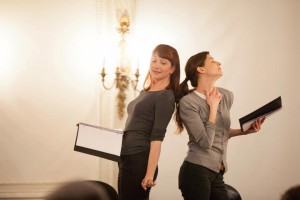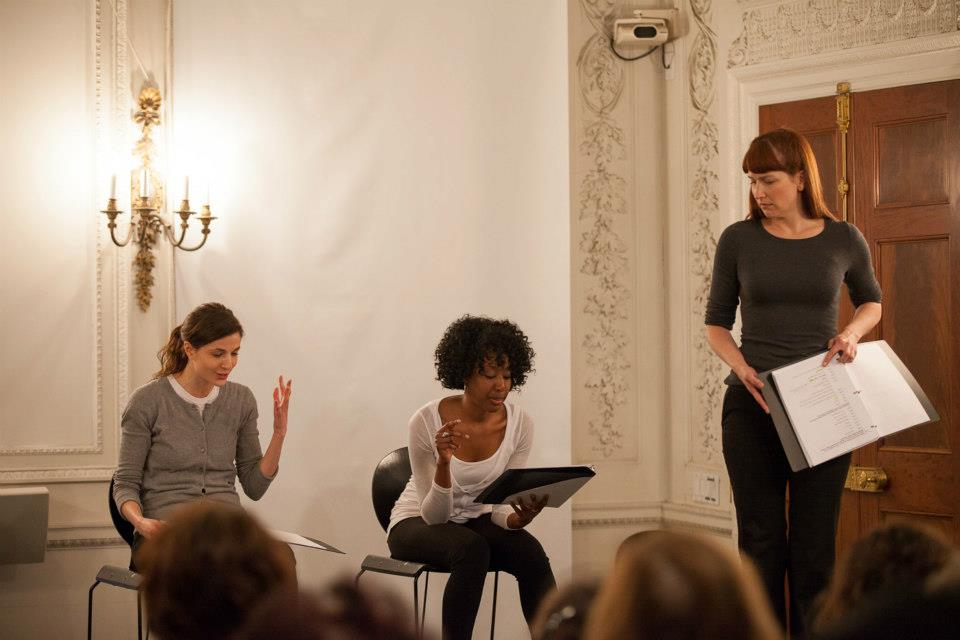Stage Review: A Pleasurably Formulaic “Best Friends” Via Israeli Stage
Anat Gov does a fine job on the meta-playwriting level. “Best Friends” is a genre piece that is also an affectionate commentary on the genre to which it belongs.
Best Friends by Anat Gov. Translated by Anthony Berris. Staged reading directed by Guy Ben-Aharon. Presented by Israeli Stage. At the Goethe-Institut, Boston, MA. April 21, 2013.
By Ian Thal

Philana Mia (Sophie) and Dakota Shepard (Lelly) in Israeli Stage’s reading of “Best Friends.” Photo: QFotos
Since founding Israeli Stage, director Guy Ben-Aharon has presided over staged readings of a rather wide range of dramas by contemporary Israeli playwrights. In some cases, these scripts have been highly nuanced studies of conflicts that are driving American discourse about the country (Motti Lerner’s At Night’s End and Gilad Evron’s Ulysses on Bottles). On other occasions, they have provided insight into the unique culture of the Jewish state, as in the case of Apples from the Desert. In one or two instances, as with A. B. Yehoshua’s Hand in Hand Together, the drama might have been unintelligible to anyone not reasonably well versed on the history of Israel.
Anat Gov’s Best Friends, however, is a striking example of just how similar the mundane day-to-day lives of ordinary people can be in modern democratic societies. The revelation will surprise only those for whom Israel exists as an ‘exotic’ land, though this mundanity is probably not what Israeli scholars, military personnel, and philanthropists to whom I have spoken mean when they speak of the shared “shared values” between Israel and America.
The comedy is structured along two alternating timelines. The first begins during a cigarette break in a high school bathroom, when sixteen-year-old Tirzah and Sophie bring Lelly into the fold. The narrative moves from chronicling their earliest experiences with dating and fellatio and moves onto marriage, break-ups, childbirth, motherhood, professional failures and successes. Then sometime in their 30s, Tizrah and Sophie have a falling out while vacationing in Paris. The other timeline takes place over a single evening: the friends are in their early 40s, around the age that Gov was in 1996 when she wrote the play. Lelly has summoned Tizrah and Sophie over to her place to tell them some important news (and perhaps reconcile her feuding friends).
A trio of friends of either gender (and, in some cases, two pairs of trios) is a fairly common device in comedies that revolve around the evolution of friendship, sex, and romance — the basic taxonomy of sitcoms are a.) family life, b.) the work place, c.) trios of unmarried friends. Thus Best Friends explores much of the same thematic material as one might see in TV’s Friends or Coupling—though it proffers a tighter dramatic structure as it deftly explores the psychological underpinnings of relationships among the different women. Lelly is the audience identification character, mediating between her zanier, more flawed, and more interesting friends. Lelly doesn’t live as grandiosely as one but neither is she as myopic as the other.
There is always a desire for domestic comedies of this type. The Israeli Stage reading was only two days after the lockdown that gripped the Boston metropolitan area in the wake of the Marathon bombing. Perhaps the audience was relieved that, instead of the company’s customary drama, it was getting a middle-brow, crowd-pleasing comedy.
Israel comes off as an accidental, if not cosmetic, setting for this relationship comedy. The secular high school the women attend as teenagers has a mandatory class on the Bible. There are occasional references to (off-stage) male characters doing mandatory stints in the IDF, in some cases specifically noting that they are stationed in Lebanon. (Israel was occupying southern Lebanon at the time in order to stem terrorist attacks on its northern cities and towns—a power vacuum that was filled by Hezbollah after Israel withdrew.) If it were not for the the fact that one of the off-stage male characters flees to California to avoid commitment, the story could easily take place in any of the large coastal communities on America’s west coast.

Philana Mia (Sophie), Marvelyn McFarlane (Tirzah) and Dakota Shepard (Lelly) in Israeli Stage’s reading of BEST FRIENDS. Photo: QFotos
Gov does a fine job on the meta-playwriting level. (She died in late 2012 at the age of 58 after a four year battle with cancer.) Best Friends is a genre piece that is also an affectionate commentary on the genre to which it belongs. But the “global” formula for laughs also means that the script lacks depth. In their early 40s, the good buddies of Best Friends are trapped in personality conflicts that were set up in their adolescence. A few lines suggest that Lelly is a professor who specializes in Napoleonic-era military history—but there’s little sense elsewhere that her character is a scholar, let alone an intellectual, or that her academic specialization reflects any serious character traits. Tirzah becomes a best selling and critically acclaimed novelist, but there is little sense that her character has any imagination—or even above-average perception (perhaps Gov is taking an ironic stab at critics who would admire the work of someone so obviously vapid). Even as she enters middle-age, Sophie never moves beyond her disappointment that her dreams of a hippy life-style are not as idyllic as she thought as a teenager.
Tellingly, Lelly’s ‘important’ news is a MacGuffin, a plot device that hardly matters because she is a stock character, a third wheel who is spun only to connect Tizrah and Sophie. Thus Best Friends is entertaining, though principally because it is an agilely banal commentary on the banality of popular entertainment. Our formulaic comedies, just like our best friends, offer the sedate pleasures of reassurance, the joys of never being surprised.
Ian Thal is a playwright, performer, and theater educator specializing in mime, commedia dell’arte, and puppetry, and has been known to act on Boston area stages from time to time, sometimes with Teatro delle Maschere. He has performed his one-man show, Arlecchino Am Ravenous, in numerous venues in Massachusetts and Rhode Island. One of his as-of-yet unproduced full-length plays was picketed by a Hamas supporter during a staged reading. He is looking for a home for his latest play, The Conversos of Venice, which is a thematic deconstruction of Shakespeare’s The Merchant of Venice. Formerly the community editor at The Jewish Advocate, he blogs irregularly at the unimaginatively entitled The Journals of Ian Thal, and writes the “Nothing But Trouble” column for The Clyde Fitch Report.
